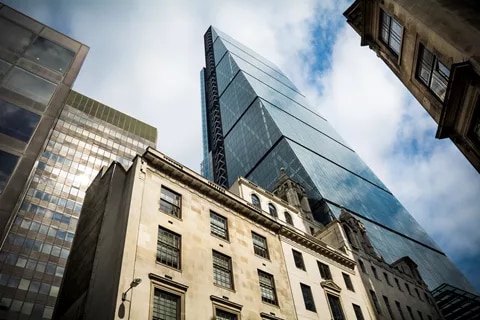The Advantages of Traditional Office vs Flexible Workspace
By Paige Tonna

In the last few years there’s been a major shift in the way people think about the best environments for work, culture and productivity. Remote working was no longer an option, it became a necessity.
As companies ease back into the workplace, many are using this opportunity to reassess their workspaces. Some have embraced a hybrid approach of shared flexible workspace and private offices, while others are moving away from traditional offices and opting for flexible workspaces and more agile ways of working.
In this article, we look the pros and cons of a flexible workspace vs a traditional office setting to help you decide which will work best for your needs.
What is a flexible workspace (flexspace)?
Flexspace is a shared workspace that offers membership to multiple companies and individuals.
The types of people and companies who use shared workspaces include startups, small or medium businesses, large national or international companies with small local presence, freelancers, digital nomads or anyone who happens to need a desk to work from on any given day. They may be made of people and companies who work out of the space every day, as well as people working there on a day to day basis. People from different businesses and industries work side by side. Whether it’s private offices next to one another, or hot desks in the coworking areas.
Flexible workspaces spaces range from large, communal open space environments with individual or group seating arrangements (coworking desks, hot desks, booths) right through to a 1-person serviced office space or larger office sectors for 30+ people.
They often have varied working areas as well as “hang-out” spaces designed to foster a community environment, and share resources such as internet, reception area and meeting rooms.
A good flexible workspace will offer a great environment and culture that is conducive to productivity, fosters creativity and inspiration, and encourages networking and collaboration.
What is a traditional office space?
A traditional office is a private office space dedicated to one business.
It usually means one business leasing one to multiple floors, or a whole building set up to your specifications to suit your business's needs.
Sometimes this can be more of an open layout style similar to flexible workspaces, but often there is more of a focus on individual work with private offices or cubicles.
Everyone has their own dedicated desk, cubicle or office, and there are dedicated meeting rooms for conferences.
Your business takes care of setting up the office and all office admin and management tasks, such as managing internet, utilities and maintenance fees, office furniture and equipment.
A traditional office setup generally requires a lease of at least two years or often longer
What are the pros of a flexible workspace?
Flexibility
As the name suggests, flexibility is one of the primary advantages of shared workspaces, whether through their short-term leasing agreements and in the office space itself.
With the ability to be able to increase or reduce number of desks and/or private offices as needed, workspace solutions like a coworking space or shared offices are a guaranteed way to ensure your businesses maintain a sustainable location and easy access to office resources.
This is particularly beneficial to companies whose business operations fluctuate at any given time, due to rapid business growth or those that operate over multiple locations.
Rather than rearranging your whole office to fit in new employees whether permanent or temporary, your third-party workspace provider does everything for you.
Networking
Many businesses can greatly benefit from the countless networking opportunities that shared workspaces provide. Working alongside a dynamic collection of individuals, businesses, creatives and niches makes it easy to build your network, collaborate and find new clients.
The business opportunities are also endless in coworking spaces as the physical space also promotes idea sharing between different companies.
Office management and admin is taken care of
One of the best things about shared workspaces is that all of the tedious and time-consuming tasks of running an office are taken care of for you, leaving you more time to focus on your work and business.
Culture and environment
Flexible workspaces promote the idea as work as fun and provide inspirational environments which help enhance productivity, well being and work life balance.
They are also designed to be modern, trendy and progressive to promote creativity and cater to individual work styles. This done through utilising office design trends such as incorporating ergonomic furniture, natural light and well-planned recreational areas.
Location
Many flexible workspaces are located in highly desirable buildings in the CBD, or creative/business hubs. These are areas that would traditionally be very difficult for individuals or small businesses to afford an office.
Many flexible workspace companies have locations in different cities and countries, which you can use while travelling or to expand your business easily into new areas.
Cost
Flexible workspaces are significantly more cost-efficient than leasing traditional office space, especially for individuals, small enterprises, and many organizations operating on tight profit margins.
As you only need to pay a set membership fee at flexible terms, switching to coworking spaces and other flexible office solutions can lead to great cost savings for businesses as they no longer have to provide resources such as equipment, kitchen facilities and maintenance costs.


What are the cons of a flexible workspace?
There are some cons associated with working from a flexible workspace, which often apply more to traditional industries and conservative companies.
Cost
Flexible workspaces are normally a cheaper option for smaller businesses. However, they may not be as cost-effective in the long term for larger companies compared to hiring their own private office. If you are an individual freelancer or consultant, flexible workspaces are more expensive compared to alternatives like working from home or from a café.
Lack of control over your environment and branding
Working from a flexible workspace such as a coworking desk or hot desk, you don't have full control over how your environment is set up and must fit in with the existing layout.
Flexi workspaces don’t allow business branding in key areas like reception and meeting areas, which can be a downside for companies who use their offices for networking opportunities.
Lack of privacy
Depending on the nature of your business, there may be some privacy or confidentiality concerns when sharing a workspace in coworking areas with other companies. The open nature of flexible workspaces means they may not be as suited to people or business who often have to hold private conversations or meetings.
Distractions
Though flexible workspaces offer great opportunities for networking and collaboration, there can also be more distractions. You can't control the environment and what other people are doing, which could become an issue when your team really needs to focus.
A traditional workspace does offer fewer distractions and fosters concentrated work, allowing your employees to work efficiently on what they do best.
Scheduling clashes
Enjoying your own dedicated office space means you won't have to deal with scheduling issues associated with shared facilities like meeting and conferencing spaces.
Having to share meeting rooms with other businesses may lead to scheduling clashes and possible disruptions to your business.
What are the advantages of traditional office space?
Control of the workspace and environment
If you lease your own office space, you have complete control over how the workspace is setup and how rooms are utilized. You can also control how your brand is presented and don't have to share branding with any other company. Having full control over your environment also means you are more easily able to prevent distractions when your team needs to focus.
Privacy
Having your own dedicated office means you don't have to worry about privacy or other businesses overhearing or seeing confidential information about your business and clients. Having more private offices is also more suited to businesses that need to have regular confidential discussions, such as law firms.
Cost
Private offices can be cheaper than flexible workspaces for larger teams, as you can enjoy economies of scale that aren't available for smaller businesses. You may also be able to negotiate for a lower rate when signing a longer-term lease.
Better for individual work
While traditional offices don't have the same networking and collaboration advantages of flexible workspaces, they can be better suited to businesses that involve more individual work.
What are the cons of traditional office space?
Less networking collaboration opportunities
With just your team occupying the space, there won't be the same opportunities for connecting with people with different skills and backgrounds or for collaborations.
Office management tasks
One of the biggest disadvantages of traditional workspaces is their lack of administrative and secretarial support.
This means as a business owner, you will need to spend more time on office admin and management, which may even mean employing additional people to oversee and complete these tasks.
Less flexibility
You need to commit to a long-term lease with a traditional office, and there is much less flexibility to add or reduce space if your team size fluctuates. For growing businesses or startups, it can be very hard to commit to a space long-term. Long-term commitment/less flexibility – usually need to commit to long term leases. It is harder to manage changes in the size of the team.
Ongoing upkeep and maintenance
Maintaining office equipment like printers and coffee machines can be time consuming and costly. In a traditional office, your business will be responsible for cleaning costs, internet and electrical maintenance and any other upkeep required.
Your business will also have to ensure that the working environment meets your employees' overall health and wellbeing needs, providing relaxation areas and break rooms critical for employee satisfaction.
Who Should Choose Flexible Workspaces?
Flexible workspaces offer significant advantages for certain individuals and businesses.
- Freelancers, consultants and entreprenuers: Coworking spaces and shared offices are incredibly valuable to freelancers and sole contractors as an alternative to working from home. These offices offer a structured environment to focus on work and gain access to resources and facilities they otherwise wouldn’t have, such as equipment, meeting rooms and IT supports.
- Startups and small businesses: The financial flexibility of a coworking space is a major perk for startups and businesses on the rise. Instead of lengthy leases for traditional offices, they can scale their workspace up or down as their team grows and avoiding unnecessary costs.
- Medium and Large Enterprises with Hybrid Teams: Flexible workspaces are an ideal alternative for businesses with employees who complete in-person and remote work. They eliminate the burden of long-term leases, expensive build-outs, and upfront costs for furniture and equipment, especially when your team isn’t all in the office at the same time.
Which industries would be most suited to flexible workspaces?
- Creative industries (Design, marketing, media)
- Tech companies
- Professional services such as finance companies and legal firms
- Not-for-profits and NGOs
- Education and training service companies
Are Flexible Office Spaces More Environmentally Friendly?
Although there is no clear cut answer, flexible workspaces have strong potential to be greener and by far more ecologically sustainable that traditional offices. Studies suggest they can generate far less CO2e per square meter compared to traditional offices. In fact, one study found that traditional offices produce 158% more emissions, with flexi spaces having average emissions of 1 unit of CO2e per m2 compared to 49 units of CO2e per m2 in a leased office.
This stems from several factors:
-
Resource Optimization: Multiple businesses share amenities and adaptable workstations, reducing overall space needed and energy consumption.
-
Smart Technology: Shared offices often utilise automated systems for lighting, heating, and cooling, minimizing wasted resources.
-
Reduced Commutes: Flexible work allows employees to work closer to home, significantly cutting down on commuting emissions.
Furthermore, many coworking spaces prioritize sustainability through eco-friendly materials, energy-efficient appliances, and recycling programs. While some construction is needed to meet demand, the overall environmental impact can be positive.
Is a flexible workspaces or traditional office better for you?
When choosing between a flexible workspaces vs a traditional office, the best option for you will depend on factors like your industry, the size of your team, your budget and the type of work you do.
Look at the various pros and cons of both flexible workspaces and traditional office spaces and consider what is most important to your business.
Flexible workspaces are often best suited to businesses who need more cash flow in the short-term as it affords them less overheads and more working capital. It also suits businesses who need access to admin and support team on an adhoc basis. If you value networking and collaboration, crave greater flexibility and would like to provide an inspiring environment to encourage creativity, a flexible workspaces may be perfect for your business.
Traditional office spaces are usually better suited to larger businesses who have more employees and can sustain capital expenses over a number of years.
There is no right or wrong choice. The important thing to consider is which option is best for your business and the current stage of growth that it’s in.
Learn More: Pros & Cons of Open Place Offices vs Cubicles
Contact Us
If you’ve got any questions call us 020 3205 7200 or fill in your information below and we’ll get back to you shortly.







